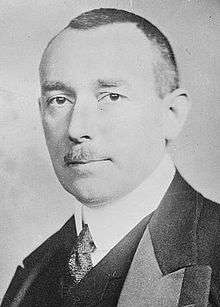Karl Helfferich
Karl Theodor Helfferich (22 July 1872 – 23 April 1924) was a German politician, economist, and financier from Neustadt an der Weinstraße in the Palatinate.[1]
Karl Helfferich | |
|---|---|
 Karl Helfferich | |
| Vice Chancellor of the German Empire | |
| In office 22 May 1916 – 24 October 1917 | |
| Chancellor | Theobald von Bethmann-Hollweg Georg Michaelis Georg von Hertling |
| Preceded by | Clemens von Delbrück |
| Succeeded by | Friedrich von Payer |
| Secretary of State of the Interior | |
| In office 22 May 1916 – 23 October 1917 | |
| Chancellor | Theobald von Bethmann-Hollweg Georg Michaelis Georg von Hertling |
| Preceded by | Clemens von Delbrück |
| Succeeded by | Max Wallraf |
| Secretary of State of the Treasury | |
| In office 21 January 1915 – 22 May 1916 | |
| Chancellor | Theobald von Bethmann-Hollweg |
| Preceded by | Hermann Kühn |
| Succeeded by | Siegfried von Roedern |
| Personal details | |
| Born | Karl Theodor Helfferich 22 July 1872 Neustadt an der Weinstraße, Rhineland-Palatinate |
| Died | 23 April 1924 (aged 51) Bellinzona, Switzerland |
| Nationality | German |
| Spouse(s) | Annette, b. von Siemens |
| Alma mater | University of Berlin University of Munich University of Strasbourg |
| Occupation | Lawyer, economist |
Biography
Helfferich studied law and political science at the universities of Munich, Berlin, and Strasbourg. He taught at the University of Berlin and later at the government school for colonial politics and oriental languages. In 1902 he entered upon a diplomatic career. He soon became a leader in the German government's policy of economic imperialism, and in 1906 he was appointed director of the Anatolian Railway which was financed by Deutsche Bank. In 1908 he was made chairman of the directorship of the powerful Deutsche Bank in Berlin.[2]
At the close of the Balkan War, Helfferich was the German financial delegate to the international conference (1913). He was Secretary for the Treasury from 1916 to 1917, and was said to be responsible for financing expenses for World War I through loans instead of taxes. He counted upon a final German victory and upon imposing heavy indemnities upon the Allies.[2] He also served as Vice-Chancellor for Chancellors Georg Michaelis and Georg von Hertling.
After the Treaty of Brest-Litovsk, Helfferich was sent to Moscow as the German Ambassador to Russia, succeeding Wilhelm Mirbach, who was assassinated. Elected to the Reichstag of 1920, Helfferich led the conservative and monarchist right, known as the Deutsch-Nationalen, and strongly opposed reparations and the economic fulfillment of the Versailles Treaty. In particular, he directed his denunciations against the democratic Catholic leader Matthias Erzberger, against whom he had a celebrated lawsuit in 1920.[2]
Helfferich was a prominent politician of the German National People's Party (DNVP) and gave radical antirepublican speeches against politicians who supported reparations fulfilment. In June 1920 he was selected as spokesman in the Reichstag for the parliamentary committee of inquiry into policies during the war, which he defended.
During the 1923 hyperinflation, Helfferich developed a plan for a new rye currency, indexed to the price (in paper marks) of rye and other agriculture products.[3][4] His plan was rejected because of the extreme variability in the price of rye compared to other commodities, but many of his plan elements were incorporated in the successful RentenMark, which began circulation on 15 November 1923. At the end of 1923, when Helfferich applied for the post of Reichbank president, he was rejected in favor of Hjalmar Schacht.
Helfferich was killed in a railway wreck near Bellinzona, Switzerland, on 23 April 1924.[1]
Legacy
His publications comprise chiefly economic and political studies.
Works
- The Reform of German Finance, 1897
- Studies on Money and Banking, 1900
- Money, 1903
- Germany's National Wealth 1888-1913, (Deutschlands Wohlstand, 1888-1913) 1915
- Speeches and Essays from the War, 1917
- Do Away with Erzberger!, Verlag Scherl, Berlin, 1919, letters to the editor, the Berlin newspaper "Tag"
- The World War, (Der Weltkrieg) (3 vols.) published 1919 by Ullstein Berlin
See also
References
- "Helfferich Killed In Swiss Disaster. Death Of German Nationalist Chief Is Established By Finding Of Passport. His Body Not Identified Those Of Other Bellinzona Victims Charred Beyond Recognition. Four Americans Safe". New York Times. April 25, 1924.
-

- Holtfrerich, Carl-Ludwig & Balderston, Theo (1986), The German Inflation, 1914-1923, New York: De Gruyter, pp. 315–318, ISBN 3-11-009714-1.
- Guttmann, William; Meehan, Patricia (1975), The Great Inflation, Germany 1919-23, Farnborough: Saxon House, pp. 206–207, ISBN 0-347-00017-7.
Further reading
- Williamson, John G. (1971), Karl Helfferich, 1872-1924: Economist, Financier, Politician, Princeton University Press.
- New International Encyclopedia
- "A Crash (obituary)", Time magazine, May 5, 1924
External links
![]()
- Works by Karl Helfferich at Project Gutenberg
- Newspaper clippings about Karl Helfferich in the 20th Century Press Archives of the ZBW
| Political offices | ||
|---|---|---|
| Preceded by Clemens von Delbrück |
Vice Chancellor of Germany 1916–1917 |
Succeeded by Friedrich von Payer |